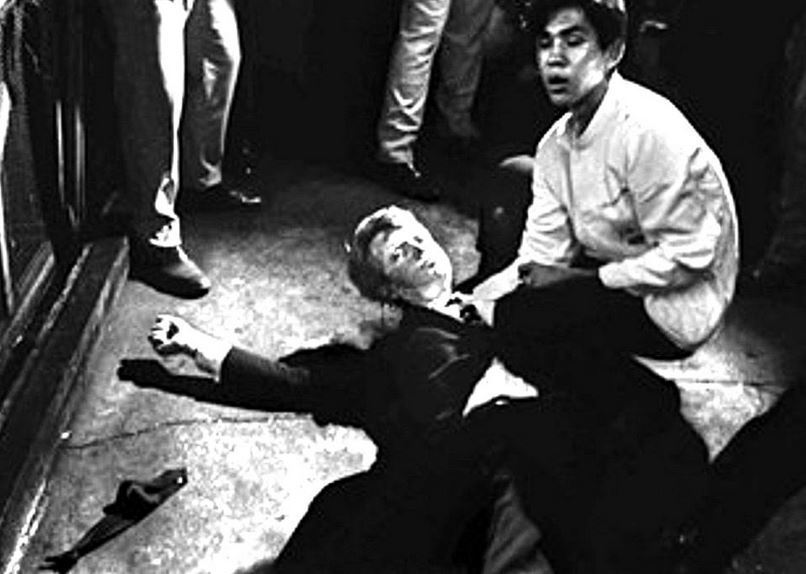Normalization and denial

My first three clear political memories are of watching LBJ’s announcement that he wasn’t running for re-election, Martin Luther King’s assassination five days later — I still remember my father’s exact words, “han matado a King,” and my mother’s horrified reply “como es posible? (Spanish for “they’ve killed King” — and why is it always “they” in both Spanish and English? — and “how is that possible?”) — and RFK’s assassination a few weeks after that. In regard to the latter I have a very clear memory of discussing this in the most matter of fact way with my friend Jill on the Thurston Elementary School playground in Ann Arbor. We were eight years old at the time.
More than half a century later, what strikes me about my memories — memories are always tricky but they can’t wait — is how all this was just completely normal to me at the time, because how couldn’t it be, given that I had literally no sense of context for any of it? This was just the way the world was: you woke up, went to school, learned that a major political figure had been assassinated the night before and that some grownups seemed upset about it, and so forth.
I woke up this morning, and the New York Times has headlined a story “Jan. 6 Hearings Give Democrats a Chance to Recast Midterm Message.”
I don’t even really blame the Times for that headline, because theater criticism of a bit of political theater is inevitable and even in one sense appropriate. Still, this lede:
Seventeen months after a mob of Donald J. Trump’s supporters stormed the Capitol with false claims of a stolen election, House Democrats plan to use a landmark set of investigative hearings beginning this week to try to refocus voters’ attention on Jan. 6, aiming to tie Republicans directly to an unprecedented plot to undermine democracy itself.
With their control of Congress hanging in the balance, Democrats plan to use made-for-television moments and a carefully choreographed rollout of revelations over the course of six hearings to remind the public of the magnitude of Mr. Trump’s effort to overturn the election, and to persuade voters that the coming midterm elections are a chance to hold Republicans accountable for it.
It is an uphill battle at a time when polls show that voters’ attention is focused elsewhere, including on inflation, rising coronavirus cases and record-high gas prices. But Democrats argue the hearings will give them a platform for making a broader case about why they deserve to stay in power.
“When these hearings are over, voters will know how irresponsibly complicit Republicans were in attempting to toss out their vote and just how far Republicans will go to gain power for themselves,” said Representative Sean Patrick Maloney, the Democratic campaign chair.
And I thought: This is crazy. Donald Trump and his administration tried to overthrow the government last year, a lot of powerful Republicans — specifically the ones he was happy enough to see lynched as part of this effort — were horrified by that for maybe a week, and then the entire Republican party “pivoted,” as Chuck Todd might and probably did say, to thinking that what Trump did was basically A-OK, because that party has been entirely radicalized by its pathological relationship — made up of equal parts of fear of and sympathy with — to its unhinged radical base.
The Big Lie, the Great Replacement Theory, the need for all tactics including revolutionary violence to be used to avoid the destruction of white supremacy — these are no longer the views of the fringe: these are the views of the party itself, or more accurately the Party.
These things are happening, but these things can’t fit into the media frame, because the media frame can’t run stories on the Republican party, en masse, conspiring to overthrow what’s left of liberal democracy in this country, because that story, if reported accurately, would break the entire frame itself.
So we get theater criticism of whether the “message” of the Jan. 6 hearings will “resonate” with voters, because you/we/they can’t handle the truth.
A child’s world is very small. It’s difficult or impossible for him to understand in the moment that June 7, 1968 isn’t a normal day, because for him, on that day, it is.
But an old person’s world is often also small, in a different way. The establishment gerontocracy can’t or won’t understand what’s happening in this country at this moment, because what’s happening is not supposed to be something that can happen, given the world in which that gerontocracy has spent so many decades now.
Too much context can be as distorting to our understanding of reality as no context at all. And so here we are today.


